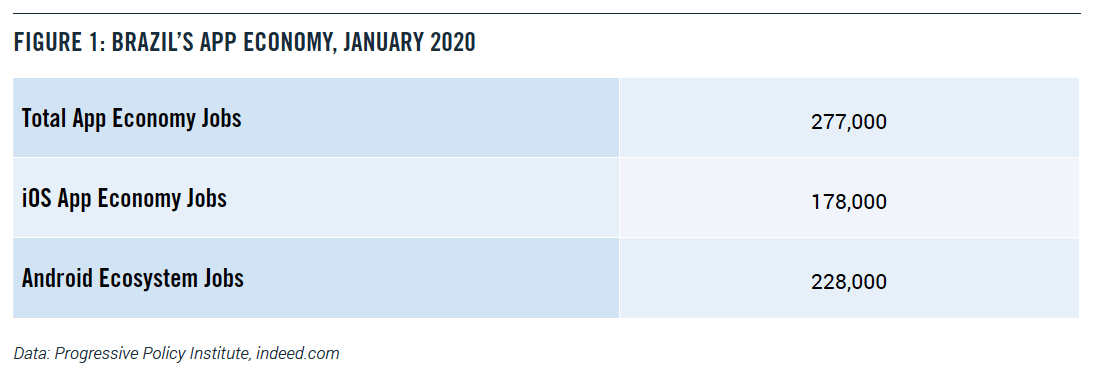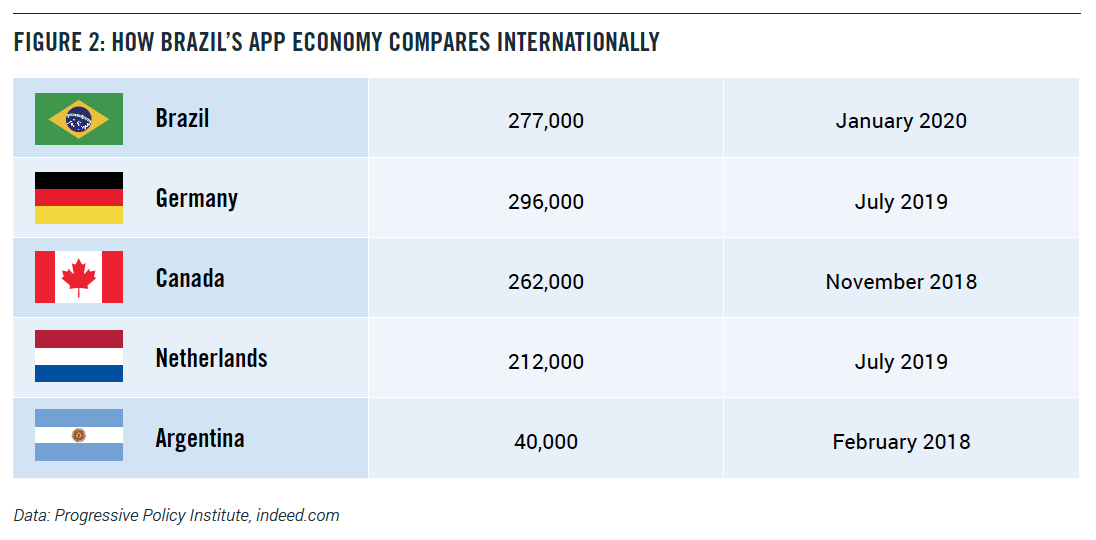(A Brazillian Portuguese version is available for download here/Versão em português do brasil)
Yet as people around the world engage in “social distancing” in order to stem the virus, the importance of connectivity and in particular wireless connectivity stand out. Mobile phones enable people and business to communicate and be productive even when they have to stay physically apart. In particular, mobile apps are becoming even more embedded into daily life.
In this paper, we focus on Brazil’s App Economy: Those app developers and other workers who create, maintain, and support an ever-expanding range of apps for health, communications, ecommerce, education, transportation, banking, and smart homes. The size of an App Economy workforce in a country is indicative of the rate at which that country is embracing the digital transformation and how well it will be positioned as the global economy recovers from the pandemic.
As of January 2020, before the global pandemic took hold, we estimate Brazil has 277,000 App Economy jobs.1 We find 178,000 App Economy jobs to belong to the iOS ecosystem, and the Android ecosystem to total 228,000 jobs. (These numbers sum to more than the total of Brazilian App Economy jobs because App Economy jobs can belong to multiple ecosystems).

How does Brazil’s App Economy compare with other countries? In absolute terms, Brazil’s 277,000 App Economy jobs as of January 2020 compares well with Canada, which had 262,000 App Economy jobs as of November 2018.2 Brazil’s App Economy rivals that of some important European Union members.3
For example, we estimated Germany to have 296,000 App Economy jobs as of July 2019 and the Netherlands to total 212,000 App Economy jobs as of July 2019. On a smaller scale, Argentina had 40,000 App Economy jobs as of February 2018 (Figure 2).4

The Brazilian App Economy is extensive both in terms of its depth and range of industries. We examined App Economy job postings as of March 2020, as the global pandemic was starting to take hold.
The Brazilian ICT sector was undoubtedly hiring App Economy workers. As of March 2020, content platform Encripta S/A was searching for a senior Android developer in Sao Paulo. IT company Indra Sistemas, S.A. was seeking a senior Java developer with knowledge of iOS and Android in Sao Paulo. Software firm TOTVS was looking for a junior front-end developer to work on mobile apps in Joinville. Mobile app development company Tap4 Mobile was hiring a mobile developer with knowledge of Swift programming in Manaus. Software developer Supero was searching for an Android developer with experience in Kotlin and Swift in Florianópolis.
The financial sector was actively hiring App Economy workers. As of March 2020, payment processor Stone Tecnologia was seeking a front-end developer with experience in iOS and Android in Sao Paulo. Financial firm SPC Brasil was looking for a senior mobile developer with iOS experience in Sao Paulo. Banking cooperative Sicredi was searching for an iOS developer in Porto Alegre. Financial research firm Empiricus was hiring a senior mobile specialist with knowledge of iOS in Sao Paulo. Payment platform PicPay was seeking an iOS developer in Vitória. Banking company Banco Itau was looking for mobile engineers with iOS and Android experience in Sao Paulo.
But other industries are also hiring App Economy workers as digital technology spreads into the physical industries. Pulp company Eldorado Brasil was hiring an Android developer in Campinas. Farming equipment manufacturer John Deere was searching for a junior backend software engineer with knowledge of Java or Kotlin in Indaiatuba. As of February 2020, appliance manufacturer Whirlpool Corporation was seeking a senior information systems analyst with experience in iOS and Android in Sao Paulo. Agricultural company Cargill was looking for a senior software engineer with experience in Xamarin and Swift in Sao Paulo. Medical e-learning company MedMKT was hiring a developer with knowledge of iOS and Android in Moncoes.
As of March 2020, retail company Via Varejo SA was searching for an Android developer in São Caetano do Sul. Event platform Uhuu! was seeking an Android developer in Porto Alegre. Travel aggregator Hurb – Hotel Urbano was looking for an Android developer in Rio de Janeiro. As of February 2020, ecommerce logistics company ASAP Log was hiring a fullstack developer with Android experience in Curitiba.
Media company Grupo Global was searching for iOS and Android developers in Rio de Janeiro as of March 2020. News company globo.com was seeking an iOS developer in Rio de Janeiro. As of February 2020, content publisher Secad was looking for a mobile application developer with experience in iOS and Android in Porto Alegre.
Academic institution Fundação Armando Alvares Penteado was hiring a mobile iOS developer in Sao Paulo as of March 2020. Research nonprofit Instituto de Pesquisas Eldorado was searching for an Android developer in Brasília. As of February 2020, research organization Atlantico Institute was seeking a junior test analyst with knowledge in Android.
The economic turmoil caused by the global pandemic is likely to depress demand for App Economy workers in the short-run in Brazil and elsewhere. But as that turmoil dies down, the economic and social changes triggered by COVID-19 are likely to expand demand for health related apps. Telehealth, or the ability to deliver healthcare at a distance, will become more important in the aftermath of the pandemic. Similarly, long distance learning will become more accepted, as will ecommerce delivery.
In a 2019 report, Brasscom, the Brazilian ICT industry association, projected the need for 70,000 new ICT professionals per year going forward. According to Brasscom, the demand is spread across such areas as mobile apps, the cloud, information security, Internet of Things, and big data.
But mobile apps are a key enabling technology, because it is only natural to use tablets or phones as the human interface for almost any technology. A farmer who accesses a program for boosting crop yields, for example, will almost invariably use an app.
And then there are gig economy apps such as Rappi, iFood, and Uber. Our figure for App Economy jobs does not include gig economy workers. However, according to the Instituto Locomotiva, approximately 17 million Brazilians regularly use an app to generate income.5 These gig economy jobs are suffering during the pandemic, but they will be a potent source of growth in the future.
In August 2018, Brazil passed Lei Geral de Proteção de Dados (LGPD), a comprehensive data protection law. Similar to the European Union’s General Data Protection Regulation, LGPD regulates the use of personal and sensitive personal data and defines an individual’s data rights such as the right to access and delete data.6 Additionally, the law requires businesses and organizations handling data to hire a data protection officer, provides ten legal bases for processing data, allows fines of two percent of a company’s Brazil revenues up to 50 million reals, and applies to multina-tional companies doing business in Brazil.
As economies become increasingly connected through globalization and digital technology, multinational companies will naturally gravitate toward investing in countries with better business conditions. Additionally, costly and burdensome requirements like LGPD make it difficult for startups to innovate and provide new products and services.
The coronavirus pandemic will undoubtedly transform global health and the economy. Ways of doing business while limiting contact like telehealth, distance learning, and ecommerce will likely see increased demand. As a result, apps and data – which allow consumers to purchase goods and services without coming into contact with others – will play a critical role in the recovery. Brazil’s App Economy is already sizable, totaling 277,000 App Economy jobs by our estimates as of January 2020. That includes the digital sector but also physical industries such as banking, ecommerce, media, and education.